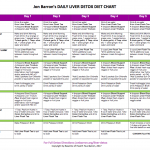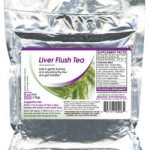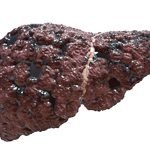Our liver is the primary filter of our body. Good health is impossible without proper function of the liver. Unfortunately, over time, we so abuse it and so overtax it that illness is the inevitable result. As part of a detox program to rebuild and repair the liver, we must naturally flush the liver.
Our liver is the primary filter of our body. Good health is impossible without proper function of the liver. Unfortunately, over time, we so abuse it and so overtax it that illness is the inevitable result. As part of a detox program to rebuild and repair the liver, we must:
- Remove all the excess fat from the liver
- Get bile flowing freely again
- Eliminate toxic waste that our livers have filtered out
- Dissolve and pass out the accumulated gallstones that are stored in our livers
- Regenerate the damaged and destroyed cells of the liver
In this liver video, learn what damages your liver, the symptoms of liver dysfunction, and how you can naturally regenerate your liver. Once you understand the functions of the liver, liver disease, and how to repair it, you can learn how to perform a complete liver detox. Watch this video and then view the link at the bottom of this article for step-by-step instructions.
Understanding Your Liver
Next to the skin, the liver is the largest organ in the body. In many ways, it is the most important organ in the body, and the last to be considered when it comes to health. In addition to being large, the liver is also a complicated organ involved in at least 200 separate functions. Generally speaking, the liver performs a vital role in regulating, synthesizing, storing, secreting, transforming, and breaking down many different substances in the body. Specifically, some of these include:
- Regulation of fat stores
- Cleansing the blood and discharging waste products
- Neutralizing and destroying poisons
- Protein metabolism, including manufacturing of new body proteins
- Metabolizing alcohol
- Managing chemicals and drugs in the blood
- Aiding the digestive process by the production of bile
- Helping the body resist infections by producing immune factors and by removing
bacteria from the bloodstream - Storing vitamins, minerals, and sugars
- Production of quick energy when needed
- Controlling the production and excretion of cholesterol
- Maintaining hormone balance
- Regenerating its own damaged tissue
The liver is so important to our well-being that many healers maintain that most diseases cannot develop in the body (that, in fact, no form of cell degeneration can occur) if the liver is functioning in an efficient, healthy manner. Conversely, an unhealthy liver is very likely at the root of most serious health problems.
So What Harms the Liver?
- Too much protein in the diet. Protein metabolism is especially taxing on the liver since it is the liver which must metabolize complex proteins into simple compounds. The greater the consumption of protein, the greater the stress on the liver.
- Too many simple carbohydrates in the diet. The body converts excess simple carbohydrates into triglycerides, which are then stored in the liver as fat. The more fat stored in the liver, the harder it is for the liver to perform its full range of normal functions.
- Overeating. Too much enzyme deficient food stresses the liver.
- Drug residues. Virtually all of the drugs that we take (medicinal, recreational, chemotherapy, whatever) are processed, purified, and refined in the liver—in preparation for elimination from the body.
- Alcohol causes inflammation of the liver’s tissue. Once the liver is inflamed, it can no longer filter, which causes it to plug up with fat and become even more inflamed. If we consume enough alcohol, we overwhelm the liver’s ability to regenerate itself, and the net result is cirrhosis (or hardening) of the liver.
- Toxins, heavy metals, and pesticides. Everything we breathe, eat, and absorb through our skin is purified and refined in the liver.
- Lack of exercise forces the liver to do the elimination work that should be done by the lungs and the skin.
- And of course, there’s always liver disease such as chronic Hepatitis C.
What Are the Symptoms of Liver Dysfunction?
- Digestive problems
- Constipation
- Low energy output
- Allergies and hay fever
- Arthritis
- Diabetes
- Hypertension
- Obesity
- Infertility
So What Can Be Done About It?
Fortunately, your liver has an astounding ability to regenerate itself—if you give it a chance. Giving it a chance means two things:
- The Don’ts
In Chapter 6 of Lessons from the Miracle Doctors, Jon discusses the elements of proper diet. Well, they particularly apply in terms of the liver. You need to eliminate (or at least cut back) the liver stressors in your diet. The sicker you are, the more cleaned up your diet needs to be. If you’re suffering from serious liver problems, a raw juice diet may be required to give your liver time to regenerate.
- The Do’s
Several times a year, you need to do an herbal liver detox/flush. You need to regularly include nutritional support for the liver. Look for formulas that contain milk thistle, dandelion root, the perennial herb Picrorhiza kurroa, and artichoke or beet leaf. (Note: Picrorhiza has been shown to protect liver cells from the many degenerative changes that would normally be caused by a variety of liver toxins. It appears to be particularly useful in treating both alcoholic liver damage and chronic viral hepatitis.)
And Finally, a Word About the Gallbladder
The poor gallbladder. Guilty by being found at the scene of the crime, it is the frequent target of the surgeon’s knife. Gallbladder removal is one of the most frequently performed operations in America. In fact, over a half-million gallbladders are removed each year in the United States.
Understand, the gallbladder is not responsible for the production of gallstones. The liver is the culprit—or rather what we do to the liver. The gallbladder is merely a holding area for bile to be used in the digestion of fats and oils. But if our diets are too high in the wrong kind of oils, if we have allergies to dairy and eggs, low levels of stomach acid, too little fiber in our diets, stress, if the liver is not functioning properly, etc., etc., etc., why then the bile produced in the liver (a mixture of cholesterol, minerals, bile salts, pigment, and lecithin) is of a type and consistency that tends to quickly harden into “stones” before it can be passed out of the gallbladder. (As a side note, women are four times more likely than men to get gallstones.)
Removing the gallbladder does not remove the problem; it merely removes the symptoms. Yes, it’s true that after gallbladder removal you’re unlikely to suffer from further gallstones. But on the other hand, you’ve now traded one problem for two new ones:
- Since you never corrected the underlying problem of imbalances in the liver, these problems will just continue to get worse—eventually compromising the liver itself.
- By removing the gallbladder, you also remove its regulating effect on bile. That means that bile is continually dumping into your intestinal tract when it is not needed, and is available in only minimal amounts when it is needed. The net result is chronic digestive problems and probable long-term nutritional deficiencies.
Far better than removing the gallbladder is a seasonal liver/gallbladder flush combined with a periodic liver rebuilding program.
Liver/Gallbladder Flush
By doing a liver cleanse detox, we’re talking about inducing the liver to purge all of the fats, old cholesterol deposits, gallstones, poisons, drug residues, and toxic waste stored therein. Probably nothing else you do (including even the bowel cleanse and detox) will make a greater difference in your overall health.
NOTE: Do not do the liver detox without cleansing the colon first. Colon detoxing is the foundation for the Liver Detox. If the intestinal tract is not functioning at 100% during the liver detox, many of the toxins being dumped by your liver will back up into your bloodstream, making you feel very unwell. Learn more. Finally, read ALL the instructions for the Liver and Gallbladder Cleanse before starting.
An Alternative Cleanse
For those who don’t want to do the full liver flush that involves a 3 or 5 day fast, there is a slow and easy version that will give you 70-80% of the benefit without the difficulty. As part of your daily diet, just eat one cup of freshly grated beets mixed with olive oil and lemon juice for 30 days straight. Daily use of the Liver Flush Tea is required and one bottle of Liver Tincture is highly recommended.










